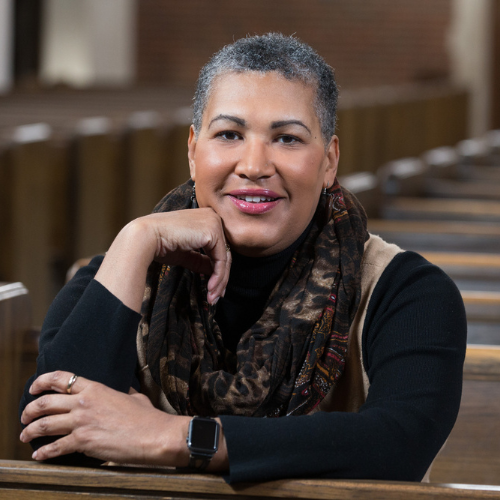Dear Working Preachers!
It’s Holy Week. And, for much more than the 40 days of this Lenten season, our congregations and communities have been in an unusual yet all-too-familiar period of waiting, a season of expectation, a time of lament. Full disclosure, for me, the journey this year feels more different than other different-feeling years. Which is why the familiarity of rehearsing the first resurrection stories is both comforting and imperative. It reminds us that God’s steadfast love endures, forever.
The scene read from Luke’s account this week is the discovery of the empty tomb. The reading from John begins similarly. That discovery rearranges how the people ask the question what next. That discovery brings credibility to the testimony of Peter recorded in Acts. Before the rumors of the resurrection spread, the empty tomb must be discovered.
Of course, we know the events that follow. But do we recognize that each of these events echo the unrelenting activity of the Creator to form a people who will not be turned over to death? Like Moses returning to Egypt, soon the missing body becomes the misidentified gardener promising life beyond the field. Like the hand writing on Belshazzar’s palace, the uninvited guest appears on the inside of the wall with words about the future. Like the one who wrestled with a fearful and distressed Jacob, the stranger first listens as we rehearse sound bites from a larger story. It’s a compelling story of promise, but how does one get a hearing in cacophony of TikTok, Twitter, and non-televised revolutions?
We tell it.
Easter Sunday, and the liturgical season that follows, is the opportunity for the church to tell why we say this is the day the Lord has made. A truth made clear because of the resurrection. From this perspective on events, the preacher invites hearers to recognize each episode recorded in Scripture draws our attention to a reality made conceivable by the resurrection. We can miss this if we rush to work out an analogy, adopt a mission statement or psychoanalyze each character named or unnamed in the text.
The message of the resurrection provides opportunities for the church to reflect on the biblical witness concerning the promise of the Creator-Covenanting God’s kingdom. In light of the resurrection Jews and Gentiles, now known as Christians, tell a story of the world after God has shown up. For it is after the resurrection that the followers of Jesus recognize that in all that he did, Jesus glorified God on earth. This particular recognition is born of a deep familiarity with the revelation of God preserved by the people called Israel. So we tell the story.
When you invite people to your congregation, do you make it clear that the only reason we testify to what God has done in our lives is so the world gets a glimpse of what God intends to do with every life? Do you make it clear that they are not on the receiving end, but on the doing end? Like Peter’s explanation to an occupied people, the message is a call to live rather than a fact to prove.
Keep the rest of the story in mind as you invite Easter Sunday listeners into the familiar scene. What comes next will be our story.
I’ve been binge watching Marvel Universe’s The Agents of the Shield. Like all the best dramas, the redundant storyline does not end each episode telling me what to do in my world. Rather, the compelling narratives draw me in, leaving me longing to know what comes next.
- What comes next when the empire’s execution cannot eradicate your hope?
- What comes next when the diagnosis of disease does not kill your dreams?
- What comes next when you cannot go to work but the business must continue?
These are the questions that are answered when we, like Cornelius, believe the resurrection means justice can be restored, when like the women believe Jesus is alive, when like the psalmist we believe God is our salvation.
Nonetheless, the next step of the first followers is not immediate clarity of the mission of God. Understanding and obedience are not the first responses of Jesus followers. More like: Perplexity and amazement, cynicism and unbelief. The disciples are clueless concerning the meaning of Jesus’ death, disappointed by this presumed dashing of their hopes, and astounded by reports of the empty tomb. (Not so much has changed.)
Despite the power of their experience, they lacked the interpretive categories for rendering recent events in a meaningful way. Our task today is as imperative because Christians today lack the capacity to speak of God in a meaningful way.
We need a biblical imagination to recognize all that God has been doing to restore the divine intention for humanity. The crucifixion was the culmination of humanity’s acts of violence against God. The resurrection is the climactic demonstration of God’s unrelenting love toward humanity.
We preach the Christian Scriptures because in them we find the complete revelation of God. Only then can we recognize that, like the first disciples, we, too, are living in the meantime. The time when we wait on God’s next move. And like Israel during the exile, for a while the people of God are displaced, residing in a hostile context, who have to learn again to sing Zion’s songs.
The disciples—then and today—remain on the journey of discovery. A journey marked by relationships with respected friends and loved ones with a shared story to tell. As we rehearse these climactic moments along the way, let’s not become distracted by the destination. If we have learned anything these past two years, it is that the journey matters. Because it is on this journey where we discover that God’s steadfast love endures forever.
Joy

